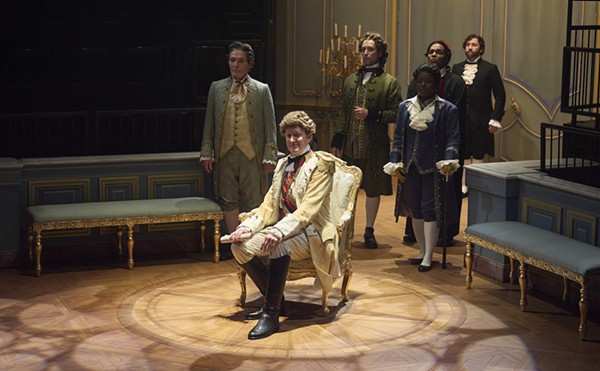Hate to disappoint you, then, but this will not be a story about vials of dried blood, diets consisting of orange food and grave sites given as anniversary presents. You will not satisfy your creepo cravings here, save to learn that Billy Bob Thornton--celebrity journos' Freak of the Week whose clock keeps on ticking--starts to itch before he has to leave the house on movie business. So move on, thrill-seekers; the wreck has been moved to the side of the road (though Angelina Jolie, one half of trailer-park royalty's most famous pairing, will make a brief cameo appearance).
The problem is, not even Arkansas' second favorite son can shy away from discussing his personal life; his disarming candor about his marriage to Jolie has gotten him into the most trouble. (Here's a tip: Never admit to a tape recorder that you wear your wife's panties to the gym. It's called "self-editing.") It has also been of little help that since winning the Academy Award for his 1996 Sling Blade screenplay and being nominated as best supporting actor for Sam Raimi's 1998 film A Simple Plan, Thornton's film career has been perceived as floundering. How the flighty have fallen, some would whisper, using his name as a punch line.
He has appeared in an unhealthy dose of critical and commercial failures (among them, Pushing Tin, Homegrown and Dwight Yoakam's directorial debut, South of Heaven, West of Hell, which was released straight to video after poor openings in Los Angeles and New York). Likely, more people knew about his tussles with Miramax over the running time of All the Pretty Horses, his adaptation of Cormac McCarthy's beloved novel, than actually saw the film when it was released at the end of last year in a gutted, muted form. And the battle over Horses has had substantial aftershocks: It will delay, for nearly two years, another film he both wrote and directed, Daddy and Them.
"In terms of the movie business, I gotta tell you, I can't stand it," he says, his voice soft and Southern. "It's worse now than it's ever been. Movies are all about the opening weekend, and it's like the guy with the most TV commercials wins...It's gotten really sad, and acting doesn't matter to them to the point where, when we did A Simple Plan, after the first few days of dailies, the studio called the producer and said, 'What in the hell is this guy doin'? Why is he wearing those glasses?' And, of course, I was the only one that got nominated for the Academy Award out of the whole bunch of 'em, and all of the sudden, they knew all along."
Though he has a handful of films due for release in coming months, including the Coen Brothers' The Man Who Wasn't There and Barry Levinson's Bandits (with Bruce Willis), instead he will spend the better part of an hour talking about his latest endeavor: the album Private Radio, his debut as a singer-songwriter of sinister, ethereal and guileless songs that sound as though they were recorded in one of hell's better-equipped honky-tonks. (Actually, it was done entirely in Thornton's basement.)
The disc, which is being released September 25 by Universal Music Group's Lost Highway imprint, is not particularly easy to listen to, and not just because Thornton occasionally sings like a drunken karaoke crooner convinced he's George Jones. But it's his inability to sing that makes the record so charming and beguiling. There is no doubt that Thornton--who sounds like no one else, despite the Tom Petty and Leonard Cohen comparisons being bandied about in the music press--is earnest, to the point of risking looking like a dope.
"Here's the thing: I don't care if Bob Dylan can sing or not or what anyone thinks about it, but if Pavarotti or someone else records 'Positively 4th Street,' his voice won't be better than Bob Dylan's," Thornton says. "Whoever meant it sings it better. Like, if someone else did a cover of one of my songs, they won't sing it as well as I do. I don't care if their voice is a thousand times better than mine, they won't sing it better than I do, because I meant it. I lived it."
To that end, the whole disc is a bit of a downer, populated by losers, loners and misanthropes looking for a good time at world's end. They live in dead-end bars named the Starlight Lounge and look for fleeting love at the bottom of a bottle; they live on the wrong side of the mountain, too frightened to find out what's on the other side of the range. Private Radio is like a dozen Thornton movies set to music, shot through with backward glances toward small towns and shotgun shacks and sidelong glances at women and dreams just out of reach.
And then there are the songs he croons and croaks to his wife: "Your Blue Shadow" is a languid ballad about time spent apart on movie sets; "Angelina" offers a portrayal of their relationship so disquietingly intimate it's downright uncomfortable for the innocent bystander (imagine sneaking a peek at strangers going at it in a parked car). "They all said we'd never make it/Two crazy panthers on the prowl," he sings, as if just to her. "They said we would only fake it for a while/But we just looked at them and growled." Thornton says when Jolie heard the latter for the first time, she cried. Sometimes, it seems even his best efforts to reclaim the couple's life from the ravenous tabloids only further feed the beast.
"It's funny," Thornton says, "maybe I'm just different, but it's not hard for me to reveal all that stuff. I mean, people have asked me a lot since I've made this record, 'Isn't it hard to reveal yourself that much?' I wouldn't do it if it was. If I didn't want people to know this stuff, I wouldn't have even written the songs or said anything. Angie and I both get mail from people who've said we've actually affected their lives, and we've affected their lives at times when they felt, like..." He pauses. "I don't know if they felt hipper to be connected to us or they felt their own darkness was cool or whatever, or sometimes they just saw people felt like they did, but if they can see you can come out of it with a good life, think what that can do for people. If somebody actually does give a damn about what I've done with my life, and if they listen to a song like 'Private Radio' and then listen to a song like 'Angelina,' then they can say, 'I was standing on the bridge, too, and maybe I got hope.' So, in that sense, it's a good thing to put out there, and I don't mind puttin' it out there at all."
Thornton wants it made clear he is no dilettante, not just some fool actor out there trying to top the pops for grins. He talks about the bands he started when he was a kid in Little Rock (his first, when he was 9, was named after San Francisco Giants first baseman Willie McCovey); he mentions the bands for which he opened (Hank Williams Jr. and Black Oak Arkansas, among others) when he played in Tres Hombres, a ZZ Top tribute band that used to tour Louisiana, Arkansas and Texas. Music, he says again and again, is "my first love." He often reminds that when he moved to Los Angeles to pursue a career in film, he also harbored dreams of becoming a recording star. Private Radio is nothing more than a dream come true, decades after the fact.
He is terrified of being dismissed as just another actor playing out the ultimate role--that of guitar-slinger prowling the stage, like a kid with a coat hanger and a mirror. He gripes that no one complains when a musician transitions into acting, but damned if the singing actor isn't a thing to poke fun at--be his name Sebastian Cabot, William Shatner or Thornton's pal and Armageddon co-star Bruce Willis. He also likes to say that if he had any intentions of topping the pops, he wouldn't have made such a somber album.
"This record is not a shock to people," he says. "This is what people would think I would do. I don't think you'd think I'd come out with a record like 'N Sync or something like that. Can you see four of me up there doing that? So many music people wanna cross over into movies, and they do, and I think it's easier for singers to become actors because of the nature of movies these days. Movies kinda look like rock videos to start with, and they can make the transition to big, fluffy commercial movies, because they're an easy place to fit in. But as an actor who tries to become a singer, you're compared to, like, Mr. French or something. It's ridiculous.
"If I was tryin' to make a vanity project, if I was tryin' to do something that was gonna make me money and make me popular on the pop charts, it wouldn't have been this record. I would've tried to find three other guys and make a record where we're singing about teen-age girls. I'm not sure what they want, but it sure wouldn't have been this."
Once revered and beloved as good ol' boy made great, Thornton's too easily dismissed by the smirking and cynical as a one-hit wonder. Private Radio ain't gonna help that. Likely, it will be treated as a novelty at best and an indulgence at worst. And he couldn't care less.
"I don't fit," Thornton says. "I just don't. When people said, 'Hey, you need to be seen. It's getting to be awards time; you need to go out and talk to people,' I didn't fit then either. I tried. But it made me feel sick. I gotta tell you, the last couple of years, man, when I go out there, I literally just get sick to my stomach. My wife and I stay home. We get out when we have to for something, but I literally--and she'll tell you this--I start to itch when I know we have to go somewhere."
Jolie is heard in the distance, shouting for her husband. They have to go somewhere. To Petco, to fetch food for their dogs. What a freak.












